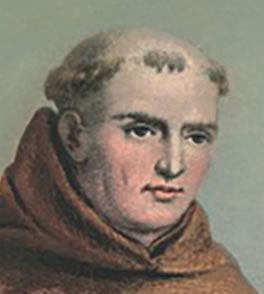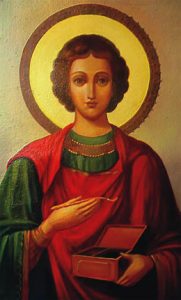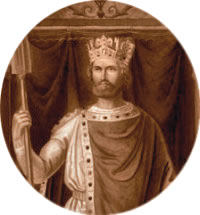July Saints
 Saint Junipero
Saint Junipero
Serra (1713-1784)
Miguel Jose Serra was born in Petra-Mallora, Majorca. At age 16, he entered the Franciscan Order and took the name Junipero, after Saint Francis’ beloved original companion friar. From his early years, he displayed remarkable brilliance, which led to his becoming a lecturer in philosophy at the university of Palma and then in Mexico. While there, he suffered a serious injury to his leg which left him permanently lame.
Sent at his own request to the Sierra Gorda Indian Mission, he served for nine years, writing a catechism in the Pamé language and preaching popular missions. In 1767, Junipero was appointed superior of a group of fifteen Franciscans going to the missions in southern California. Two years later, he was part of the foundation of Mission San Diego de Alcala, marking the introduction of a new civilisation in California.
Junipero came to California as a 56-year-old asthmatic, suffering from a chronic leg sore. Yet he covered thousands of miles on foot, on mules and by sea, bringing the Catholic religion to California, and a chain of nine missions. He introduced agriculture and irrigation systems, created a network of roads, and pressed for a system of law to protect the native Americans against the abuses of Spanish soldiers.
Junipero had his critics, especially when he championed the cause of the Indian people over the soldiers. Some civil authorities complained that he really did not want to co-operate with the civilian government because his first care was always to take care of his mission.
Although Junipero suffered many trials and severe physical pain throughout his ministry, he never asked to be spared from his labours. Absolute confidence in the Providence of God was a hallmark of his ministry, proving him a true son of Saint Francis. He died, exhausted and ill from his exertions, in 1784.
Saint Junipero, help us to be diligent in spreading God’s truth in the world.
(Source: Internet – various)
 Saint Pantaleon
Saint Pantaleon
(275-303)
Saint Pantaleon came from Nicomedia, near the Black Sea, in Asia. He was such a famous doctor that the Roman Emperor himself chose him to be his physician. Pantaleon was a Christian, but the bad influence of the pagan court caused him to give up his Christian faith entirely.
A holy priest, Hermolaos, made him realise what a sin he had committed. Pantaleon listened to him, repented of his sin, and joined the Church once more. To make up for what he had done, he greatly desired to suffer and die for Jesus. He imitated Our Lord’s charity by taking care of poor sick people without charge.
When the Emperor Diocletian began his persecution, Pantaleon gave away everything he owned to the poor. Having been accused of being a Christian, he was given the choice of denying his faith or being put to death. No torture could force Pantaleon to deny his faith.
Saint Pantaleon, obtain for us the spirit of true repentance.
(Source: http://www.catholic.org/saints/saint.php?saint_id=373)
 Saint Henry II
Saint Henry II
(972-1024)
Henry was the son of Duke Henry of Bavaria. During his youth, he received both an education and spiritual guidance from Saint Wolfgang of Regensberg, whose lessons left a lasting mark on his soul. Henry was an intelligent and devout student, it was thought that he might become a priest.
He became Duke of Bavaria in 995 and was supported by the Church in his accession to the throne as King of Germany in 1002.
In 1014, Henry journeyed to Rome where Pope Benedict VIII formally crowned him as head of the Holy Roman Empire. He became a great patron of churches and monasteries, as well as making enormous contributions for the relief of the poor.
Henry’s extraordinary generosity was made possible, in part, by his lack of an heir. He married Saint Cunigunde of Luxembourg, but they had no children. Some accounts say that the couple took vows of virginity and never consummated their marriage.
For the last years of his life, Henry had to deal with serious illness, and an additional ailment that crippled his left leg, as well as coping with his imperial responsibilities. He found support in prayer during these trials, and seriously considered resigning his imperial leadership in order to become a monk.
Saint Henry, teach us to be strong in fulfilling our vocation.
(Source: http://www.catholicnewsagency.com/saint.php?n=520)
 Entries(RSS)
Entries(RSS)